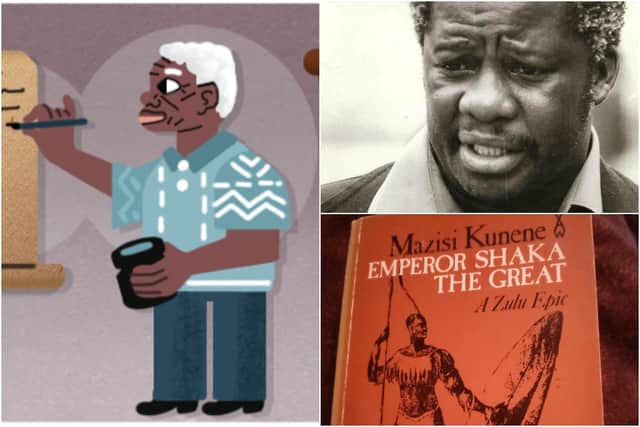Mazisi Kunene: poems, who was anti-apartheid activist, what does today’s Google Doodle mean - how did he die?
and live on Freeview channel 276
Today’s (12 May 2022) Google Doodle celebrates the life of South African poet, Mazisi Kunene.
On what would have been his 92nd birthday, the search engine has honoured the anti-apartheid activist with a special image commemorating his work.
Advertisement
Hide AdAdvertisement
Hide AdBut who is Kunene, what is he best known for, and why is his life worth celebrating?
Here is everything you need to know about him.
Who was Mazisi Kunene?
Mazisi Kunene was a South African poet best known for ‘Emperor Shaka the Great’, an epic poem based on the Zulu oral tradition, compiled in the Zulu language and then translated to English by Kunene himself.
The poem chronicles the life of Shaka Zulu, a Zulu ruler who made significant contributions to the Zulu state’s structure and military technology.
Kunene was born in Durban, South Africa, and began writing poems and short stories in Zulu as a child - by the age of 11, he had been published in local newspapers.
Advertisement
Hide AdAdvertisement
Hide AdHe became a staunch supporter for the preservation of traditional Zulu poetic traditions as he grew older, and went on to receive a Bachelor of Arts in Zulu and history from the University of Natal, as well as a Master of Arts in Zulu Poetry.
In 1959, he moved to study at the School of Oriental and African Studies, but Kunene’s move wasn’t just an educational one, he was also fleeing into exile, having opposed the South African apartheid government as the head of the African United Front.


Kunene utilised his art to protest the government’s discriminatory segregation system, and when the South African government retaliated with violence, he escaped to the UK.
Kunene was closely tied to the African National Congress - a South African social-democratic political party - and swiftly rose to become its principal spokesperson in Europe and the United States.
What poems did he write?
Advertisement
Hide AdAdvertisement
Hide AdDuring this time, though his work was forbidden in South Africa, Kunene would write some of his most important works, which explored South African culture, religion and history in the context of colonialism, apartheid, and slavery.
Some of his more notable works include ’Anthem of the Decades’ - which tells the Zulu legend of how death came to mankind - and ‘The Ancestors and the Sacred Mountain’, a collection of 100 poems published in 1982 which have a particular emphasis on socio-political topics.
His most famous work is the aforementioned epic ‘Emperor Shaka the Great’, described by World Literature Today contributor Christopher Larson as "a monumental undertaking and achievement by any standards."
Kunene became a Professor of African literature at the University of California in 1975 after lecturing in a number of universities as a cultural advisor for UNESCO, where he remained for nearly two decades, retiring in 1992.
Advertisement
Hide AdAdvertisement
Hide AdHe returned to South Africa after his retirement to teach at the University of Natal; he was named Africa’s poet laureate by UNESCO in 1993, and South Africa’s first poet laureate in 2005.
How did he die?
He died on 11 August 200 in Durban, following a long battle with cancer.
Kunene’s poetry, as well as the Mazisi Kunene Foundation Trust, dedicated to cultivating Africa’s next generation of literary talent, carry on his legacy.
Comment Guidelines
National World encourages reader discussion on our stories. User feedback, insights and back-and-forth exchanges add a rich layer of context to reporting. Please review our Community Guidelines before commenting.
